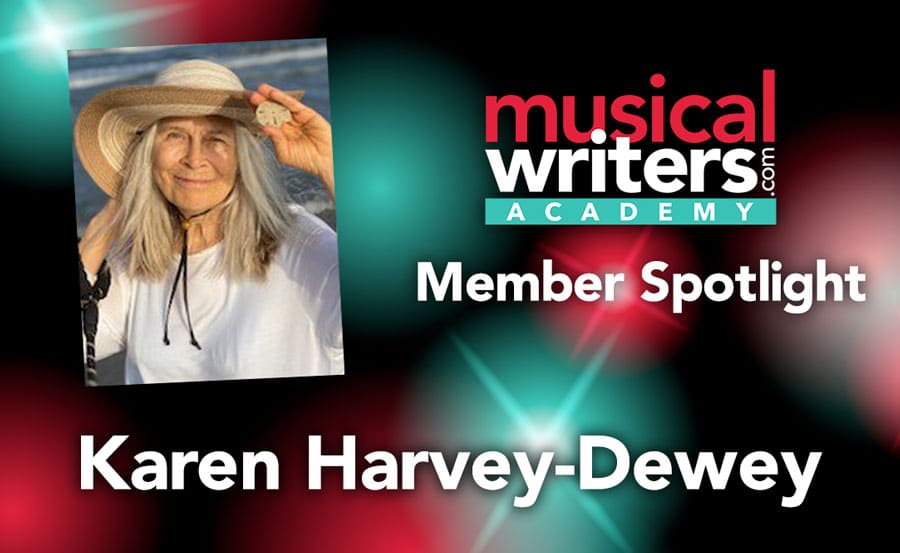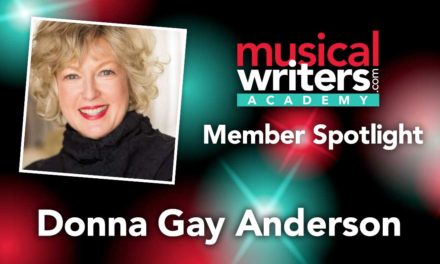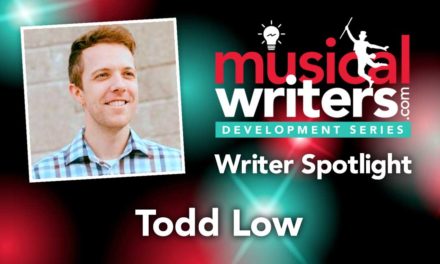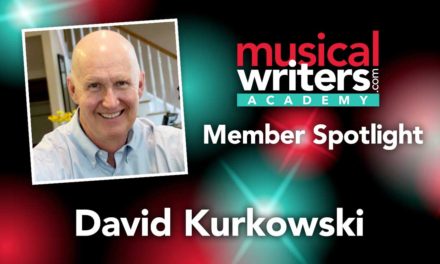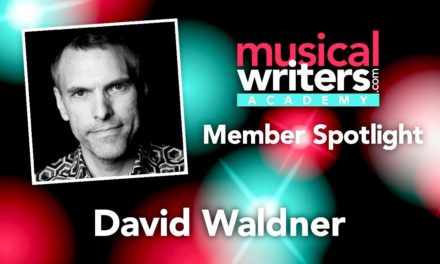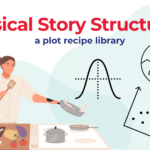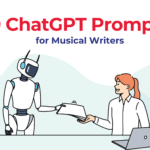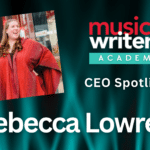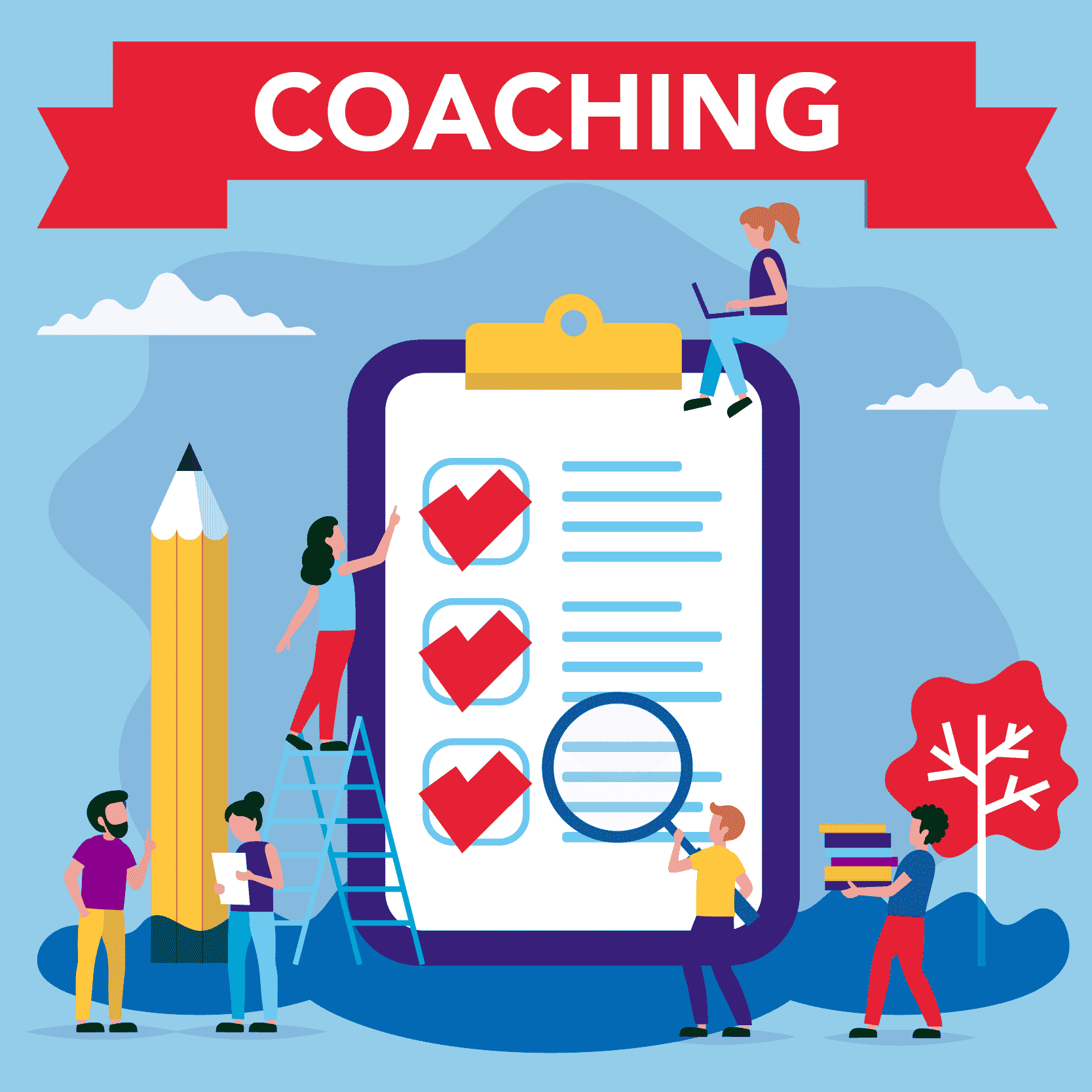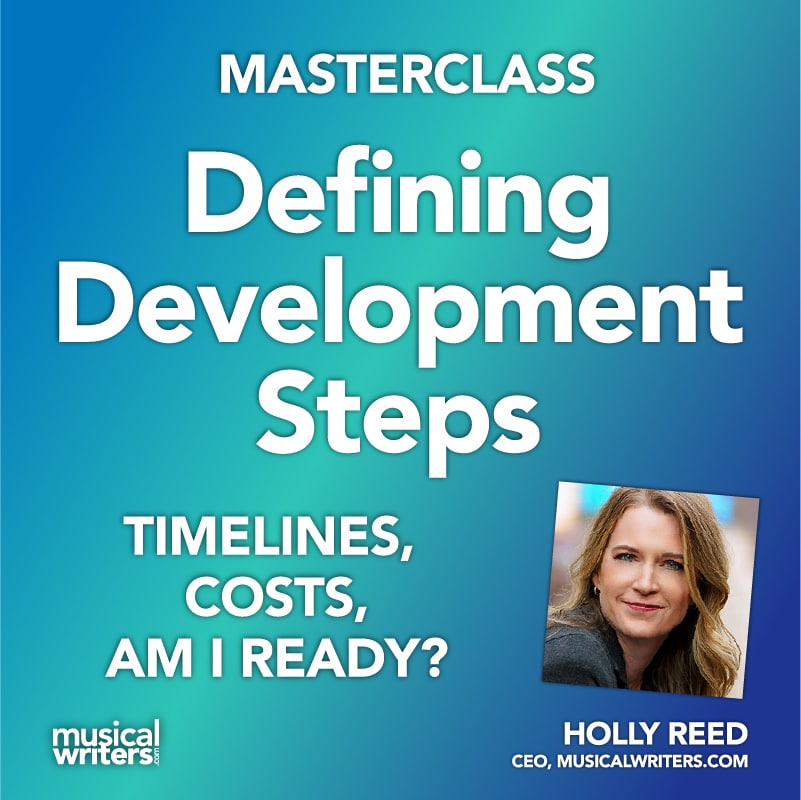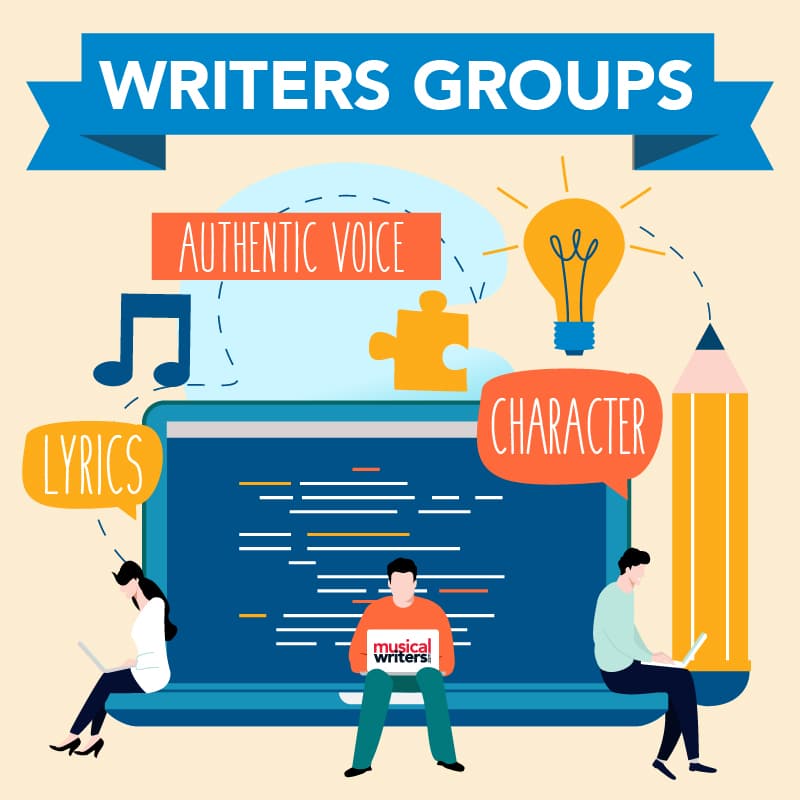MusicalWriters Academy is made up of playwrights, librettists, composers, and lyricists from all over the world. We love supporting our members, and we want to help share what they’re doing, what they’re learning, and where they’re headed.
Karen Harvey-Dewey is one of our fantastic members. Karen has adapted one of her plays into a screenplay and it recently was a semi-finalist in the Vegas Movie Awards.
What are you working on right now?
Karen Harvey-Dewey: I’m working toward getting Lady of the Rose—a Musical Odyssey produced. That means submitting follow-up materials to the Vegas Movie Awards Graphic Dept. I continue to work on contest submissions, and consider that part of my evolving marketing plan for the stage-play and screenplay versions of Lady of the Rose.
This month, I’m finishing the recordings of cursory vocals and layering them on top of the instrumental tracks of my demo album for Lady of the Rose—a Musical Odyssey. My goal is to have a production-ready script and finished recordings by Christmas. As far as writing another musical or a screenplay, I’m in the initial stage of exploring the possibilities… digging into ‘buried treasure’?
What is a lesson from your writing journey that you’d like to share?
K.H-D.: The biggest takeaway is “focusing on the dream and giving it steam” can pay off. For me, that means: First, getting up early like 3:00-4:00 a.m. when there is little distraction and my creative juices flow best. Second, seriously praying and giving thanks and seeking out other guidance and resources to learn and improve. Third, being open to learning from critiques and mistakes—not to allow myself to wallow in rejection’s mire. (at least not more than a day or so!)
Writing a musical isn’t easy. What’s your “why” in being a musical writer?
K.H-D.: As an educator, I believe that the musical is the most potent and joyful way to reach the hearts and minds of many; its combination of rhythm, music/melody and lyrics with heightened emotional storytelling mixes with powerful imagery to offer an elixir straight to the heart and brain. The sights and sounds and emotions we perceive as ‘out there’ are experienced by the brain as happening internally—our mind doesn’t distinguish the inner/outer experience. Therefore, the musical can render a very personal and powerful experience—one that can uplift, alter or enhance human perspective and experience.
Why did you join MusicalWriters Academy?
K.H-D.: The MW Academy offers incredible resources, opportunities, and community for aspiring musical writers like myself. It is located on the easy-to-navigate MusicalWriters.com website. The Academy offers free educational resources, such as timely ‘how to’ articles, videos, event and submission calendars, top-notch professional speakers, Zoom courses, advice and community—all this at a reasonable monthly price.
How did you get bit by the theater bug?
K.H-D.: I don’t know—but it had to have been something to do with my upbringing. As a child, I had three years of piano lessons. In junior high, I took orchestra and had violin lessons. When my family moved from the city to the country, I joined the high school chorus. Christmas was a special time with home-spun family entertainment: Mom on the piano, my sister Kris on the flute and me on Dad’s beautiful hand-carved violin. Certainly I was influenced by my mother and grandmother’s love of music, piano and musical theater. As a kid, I produced a hilarious garage adaptation of South Pacific.
What do you love about MusicalWriters.com?
K.H-D.: I love seeing and hearing what other writers are feeling and doing. It’s encouraging to learn about their journey and accomplishments. Basically, I love MusicalWriters for the same reasons I love the MW Academy—plus the fact that MusicalWriters.com offers script formatting, coverage, graphic arts, and music services. MusicalWriters has become my favorite go-to place for encouragement, musical writing guidance, and resources.
MusicalWriters has become my favorite go-to place for encouragement, musical writing guidance, and resources.
~Karen Harvey-Dewey
Tell us more about how you adapted your musical into a screenplay.
K.H-D.: Well, I decided to adapt it first because my stage play called for so much technology (space-stage lighting, 3D holography or VR, and screen projection systems, etc.). The musical further calls for many technical effects, props and tricks, such as aerial lifts for the Angelical Choir and rocketing-Madonna, water falls, oceans, a cane-snake metamorphosis, lightning, rainbows, and a Goddess emerging from the ocean and transforming into Lady of the Rose. The biggest challenge might be the steam locomotive skyship the “Star Zephyr” blast-off from a beach with the Lady, Boy and Girl aboard the caboose for the Sun-Moon-Star Trek. I was told, that all of the above would be more easily done, if not more cheaply accomplished using cinematographic technologies.
There really wasn’t too much to adapting from stage to screenplay other than the formatting, which involved cutting to the chase: minimal stage direction, just the story via dialogue, action(s) and music. I learned that a screenplay explains action by creating mental images. The script needed to flow—to read unencumbered.
The adaptation began when I decided to learn screenplay formatting. I took a course by the “Storylosopher” (which was very helpful in my initial screenplay formatting), and then followed up with a formatting service to make sure I got it as right as I could.
What have you learned from the movie industry that has helped you in the theatre industry?
K.H-D.: I’ve learned what a logline is and its all-important marketing function—distilling the essence of your story in a compelling way (into two sentences or less) so to catch the eye of contest judges, producers, directors, agents, etc. Creating a logline and synopsis has forced me to examine what the core of my musical is about—something I understand is very important to convey when you are doing any pitch, whether it be a stage play or screenplay.
What is your favorite musical writing tech tool?
K.H-D.: The jury is out on that! I’ve only used FinalDraft. I almost forgot about my recent subscription to Acrobat Pro—it’s been a lifesaver, in that it allows me to edit my pdf files—I also learned it will password protect a pdf. I’ve purchased an I-Rig which allows me to plug in a professional vocal mic, my trusty Shure, into my iPad’s GarageBand. So far, I really like the quality and simple recording capabilities. I think I would really like Dorico for notation and instrumentation if I had time to learn and apply the software—when I tried the free version, Dorico easily took my song’s MIDI file and produced a beautifully simple piano/vocal notation score—just by uploading my MIDI file. Hiring a professional notator can get very expensive. That’s partly why I like doing my own thing, in my own simple studio—my Roland keyboard, my M-Audio M-TRACK 2X2 and my laptop, intel CORE i7.
Karen Harvey-Dewey is a composer/singer-songwriter/artist/author, environmental-peace activist, researcher, and teacher. Her formal background is in education and the arts with Bachelor of Science degrees in Physical Education, Art, and Biology.
Most recently her script and lyrics for the screenplay version of Lady of the Rose–a Musical Odyssey, was selected to be in the 2021 International Film Festival Milan/ World Cinema Milan. It was also recently selected as a “Semi-Finalist” (Best 6) in the Oct. 2021 Fantasy/Sci-Fi Vegas Movie Awards competition. It recently made the International Screenplay Association’s Sci-Fi/Fantasy Genre Busting quarter-finals and is a quarter-finalist in the Atlanta International Film Festival.
In the mid-2000’s, there were several museum exhibitions of Karen’s art and water photographs. Karen did school story-readings/music tours with Earth Day themes–and gave slide presentations of her children’s book, “Pau Pau and the Watering Hole” (co-authored with studio partner M. Wolford). Karen also published several environmental news articles, mostly related to mining, nuclear, and Native American issues.
For more information about Karen and her work visit www.musartproject.com.

